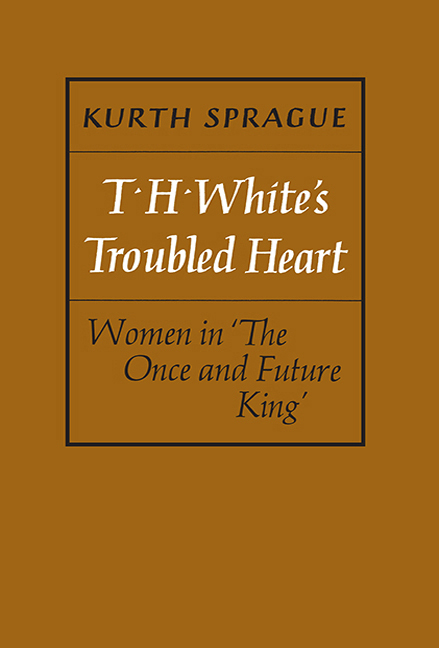Book contents
- Frontmatter
- Dedication
- Contents
- Miscellaneous Frontmatter
- Acknowledgements
- Foreword T. H. White Holdings at the Harry Ransom Center
- Preface
- Introduction
- Chapter One T.H. White
- Chapter Two Constance White
- Chapter Three White's Sources
- Chapter Four Omitted and Minor Characters
- Chapter Five Morgause
- Chapter Six Guenever
- Conclusion
- Appendixes
- Notes
- Survey of Criticism on White
- Bibliography
- Frontmatter
- Dedication
- Contents
- Miscellaneous Frontmatter
- Acknowledgements
- Foreword T. H. White Holdings at the Harry Ransom Center
- Preface
- Introduction
- Chapter One T.H. White
- Chapter Two Constance White
- Chapter Three White's Sources
- Chapter Four Omitted and Minor Characters
- Chapter Five Morgause
- Chapter Six Guenever
- Conclusion
- Appendixes
- Notes
- Survey of Criticism on White
- Bibliography
Summary
As the focus of this book has been not only on White's women, but on White himself, I would be remiss were I to fail to examine the character with whom White most identified, Lancelot. Much of White's personality can be found in Lancelot and his relationships to the women in TOAFK. Further, the history of the composition of Knight and Merlyn, like that of Witch and Queen, reveals much about White's feelings toward women as well as his ability as a superb craftsman to overcome his limitations. Indeed, examination of White's life during the time of his writing casts extraordinary illumination on his powers of creation, and the psychological pressures under which he wrote.
The whole epic of TOAFK belongs, naturally enough, to Arthur. But it is among White's greatest accomplishments that his subordinate characters are often realized with a brilliance which throws them into competition with the main characters. Merlyn, although an important character, is subordinate to Arthur in the hierarchy of importance; but when he leaves the pages of TOAFK, in Queen, the remaining books suffer.
When one looks at each of the constituent volumes, one sees that, considered individually, each is concerned with other people: Sword is the young Wart's (with a generous assistance from Merlyn); Queen is Morgause's; Knight is Lancelot's and Guenever's. But Candle, which by rights should belong to Arthur alone, both individually and as the series hero, is less his than one might expect. Mordred's crooked shape throws a grotesque shadow across its pages.
The evil that Mordred embodies is real and palpable; his oncoming madness does not serve to mitigate his depravity in the reader's mind. The revelation (not made until Candle) of Arthur's attempt on Mordred's life when the bastard was but yet a baby, is singularly ineffective in summoning the reader's sympathy for Mordred's plans for revenge; one feels only admiration for Arthur when the King makes Lancelot promise him not to kill Mordred.
But even if one is unmoved by the story of Arthur trying to kill Mordred, one recognizes instinctively the sufficiency of Mordred's hatred on the basis of a primitive level of father and son struggle. It makes sense: the young, birthrightless son and the wise old king. It is an archetypal contest.
- Type
- Chapter
- Information
- T. H. White's Troubled HeartWomen in <I>The Once and Future King</I>, pp. 143 - 170Publisher: Boydell & BrewerPrint publication year: 2007



